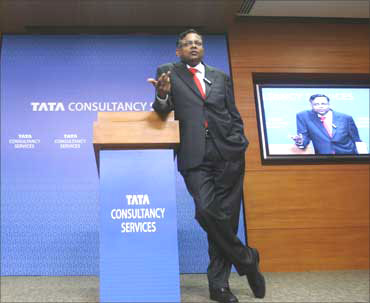 | « Back to article | Print this article |
Jobs are back! IT, auto, others to hire thousands
Jobs are back with a bang in India, proving it to be the most optimistic nation in terms of hiring plans.
The 'cautious optimism' that pervaded throughout the last year has evaporated and companies are now looking to hire aggressively.
The IT sector, whose growth had dived to single digits in 2008, has entered another growth phase, with multinational corporations looking to India to expand their footprints, Kris Gopalakrishnan, managing director and CEO, Infosys Technologies, said on Saturday.
With the IT sector back on its feet, companies have started hiring and expanding again. The top five companies are estimated to hire 160,000 to 180,000 new employees in the next one year, Gopalakrishnan said.
This phenomenon offers tier-two and tier-three Indian cities opportunities to expand, he said.
"There are two options for any city - grow or die. If a city does not grow, over time people and businesses start moving out, and ultimately the city dies," he said.
Click NEXT to read on . . .
Jobs are back! IT, auto, others to hire thousands
TCS to hire 37,000 engineers
The country's largest information technology services provider, Tata Consultancy Services has said it will hire 37,000 engineers from campuses for 2011-12, 13,000 more than this financial year.
For 2010-11, TCS had made 24,000 campus offers.
The company has already crossed its hiring target of 50,000 employees for 2010-11 and will be adding 12,000-15,000 employees in the fourth quarter of this financial year.
"For the next financial year, we have decided to hire 37,000 from campuses. Of this, we have already given offers to 23,696 students. These trainees will join TCS towards the end of the first quarter of 2011-12," said Ajoy Mukherjee, vice-president, head, global human resources, TCS. The company visited 171 educational institutions.
If the company manages to add 15,000 people by the end of this quarter, it will have a headcount of more than 200,000. At the end of the third quarter, TCS had a headcount of 186,914.
Mukherjee also said the company was reviving its promotion policy for senior management. "Last quarter, we had announced that for junior employees, promotions will happen on a quarterly basis. And we can see the impact of this decision, as the attrition rate in this segment has come down. Staring from this January, we will start the senior promotions twice a year," said Mukherjee.
He also said the company was working on salary rise details and would announce it in April. "It is difficult to share the average hike that we will announce. We are still working on the details. But they will kick in from April onwards." Last year, TCS had given an average salary hike of 10 per cent.
Click NEXT to read on . . .
Jobs are back! IT, auto, others to hire thousands
Cognizant to hire 25,000 people in 2011
Nasdaq-listed information technology company Cognizant Technology Solutions plans to recruit another 25,000 people in 2011.
CTS, which follows the calendar year as the accounting period, recruited 25,000 people in 2010 too, as it expanded its verticals and focused on new geographies.
"While it is tough to make exact estimates at present, we are looking at recruiting numbers comparable to, if not more than last year's," said R Chandrasekaran, president and managing director of CTS.
He was speaking to reporters after inaugurating the company's second campus in Kolkata. After completion, the facility will be able to house 16,000 IT professionals.
At present, CTS has 8,000 employees in Kolkata. The new campus is one of the company's two major campuses. The other one is in Chennai and it can house 15,000 people. CTS has about 100,000 employees across the country.
The Chennai-headquartered company, which spent $180 million on infrastructure development, both in terms of campus development and leasing space for footprint expansion, is also looking at new regions to expand its reach. It also wants to reduce reliance on the North American market, due to growing protectionism and increasing levels of saturation.
Click NEXT to read on . . .
Jobs are back! IT, auto, others to hire thousands
FCI to hire 9,000 in next 3 years
The Food Corporation of India, the government's nodal agency for procurement and distribution of foodgrains, today said it will hire 9,000 professionals in the next three years.
"We will fill-up approximately 9,000 posts in various categories in next three years," FCI Chairman and Managing Director Siraj Hussain said during the launch of the revamped website of the organisation.
While the scale of foodgrains dealt by FCI has increased substantially over last three decades, its manpower has been drastically reduced in the wake of staff retirement to almost half, he said.
Currently, there are over 33,000 staff working with FCI across the country. About 20,000 employees will be retired in next two years, he added.
Click NEXT to read on . . .
Jobs are back! IT, auto, others to hire thousands
Airlines to add 5,000 professionals
Airlines in India are likely to hire 5,000 professionals across various operations this year, including cabin crew, ground staff and pilots, following the evident boom in the aviation sector.
"Airlines had pulled out at least 20% capacity from the market during the downturn. That capacity was restored last year and we see airlines adding another 20% capacity this year and would be hiring 4,500-5,000 people this year," said Kapil Kaul, CEO of aviation consultancy firm Centre for Asia Pacific Aviation, South Asia, said while speaking to a business daily.
In one of its largest hiring programmes since the Indian Airlines-Air India merger, the airline is increasing cabin crew by 700 to tide over the current shortage. New hires will be a mix of trainees and experienced staff.
"The need to hire emerged after we saw a shortage of crew. We will also need a lot of people for our expansion plans, with Delhi airport becoming our hub," said an Air India official, who did not wish to be identified. Air India has 3,200 cabin crew and a negligible attrition rate.
At the same time, Air India Express, the low-cost wing of the airline, is planning to induct four more aircraft and will require 74 new cabin crew members. This addition will help increase the number of flights from 168 to over 200.
Experts say that Air India and low-cost airlines IndiGo and SpiceJet will add more than 1,000 this year.
Click NEXT to read on . . .
Jobs are back! IT, auto, others to hire thousands
Car makers to employ over 3,000
Passenger vehicle sales likely to rise to 5 million units by 2015 and over 9 million units by 2020, from the current figure of 1.95 million due to the strong domestic demand and export of small cars.
Carmakers in Indian now are eyeing more research and development personnel from India and overseas as they plan to ramp up their capacities to grab a bigger share of India's rapidly growing car market.
General Motors India, Maruti Suzuki India, Hyundai and Mahindra and Mahindra will also new talent from the United States and Europe.
Maruti is likely to hire 1,500 people from India by March. M&M, the country's largest utility vehicle maker, too plans to recruit fresh talent.
Click NEXT to read on . . .
Jobs are back! IT, auto, others to hire thousands
Accor to create 3000 jobs in India next year
Global hospitality firm Accor has said that it will hire 3,000 people by next year in India to fill vacancies being created at its upcoming hotels in the country.
Accor currently operates eight hotels under brands, Novotel, Ibis and Mercure, and two convention centres that employ about 2,000 people.
"By the end of 2011, we will employ total 5,000 people at Accor operated properties across India," Accor Hotels India, regional director of human resources ashwin A Shirali told media.
About 30 per cent of the job opportunities being created will be for entry level jobs, he said. The company will operate ten new properties that are likely to come up in 2011.
In August this year, Accor had said that it plans to open 90 hotels by 2015, out of which contracts for 60 hotels have already been signed. Around 21 hotels are likely to be operational by the end of 2012.
At present Accor, in partnership with InterGlobe Enterprises, runs hotels under the Ibis brand and has partnership with other companies for Novotel and Mercure brand.
Click NEXT to read on . . .
Jobs are back! IT, auto, others to hire thousands
Nokia Siemens Networks to hire 800 more
Nokia Siemens Networks, a provider of mobile infrastructure and managed services, will establish a new facility at Navalur in Chennai in addition to the existing facility at Taramani as part of its global network solutions centre.
The new facility, spread across 90,000 square feet, is nearly three times in size from its existing facility.
"We will be scaling up to 1,800 employees in Chennai by 2011, from current 1,000," said Armando Almeida, head of global services at NSN. NSN has a another 1,500 based in Noida.
The Chennai centre provides remote delivery support services including network implementation and managed services. It is one of the three operating GNSCs globally. The other two are at Noida, India and Lisbon in Portugal. Two new centres at Moscow and Sao Paulo are being set up to be in the same time zones as potential markets and also to address language requirements.
"The growth in business is partly in anticipation of 3G services in India and partly due to operators preferring us for network management," said Almeida.
Click NEXT to read on . . .
Jobs are back! IT, auto, others to hire thousands
Coca-Cola to hire 600
The India arm of global beverage maker Coca-Cola plans to hire around 600 workforce this year, which accounts for around nine per cent of the existing employees, a top company executive has said.
"We are looking at recruiting around 600 employees in our India operations this calendar year," Hindustan Coca Cola Beverages vice president (HR) P V Ramana Murthy said.
The recruitment would be made across all levels, including management trainees, he said.
The company's current head-count stands at 6,500, which will be increased to around 7,100 this year, Mr. Murthy said.
Hindustan Coca Cola has plans to gradually reduce the hiring of lateral talent in its bid to groom trainees into mid management cadre, he said.
"We are planning to slowly, in about five years, reduce hiring of experienced people and increase the recruitment of management trainees. These trainees will be groomed to take over these mid to high level posts in future," Mr. Murthy said.
He said for retaining these groomed executives, the company is planning to incentivise them or offer them compensation, which will be more in the form of emotional and cultural aspect.
"We will concentrate on creating a work environment, which will be more comfortable and have facilities to suit these young executives. If the need arises we will also look into offering them customised incentives," Murthy added.
Hindustan Coca-Cola Beverages is wholly-owned subsidiary of Atlanta-based Coca-Cola, responsible for manufacturing, sale and distribution of beverages across the country.
Click NEXT to read on . . .
Jobs are back! IT, auto, others to hire thousands
Bright prospects for working moms
With accelerating economy and brightening of employment prospects, 56 per cent of Indian companies are looking to recruit working mothers in 2011.
In fact, research from workplace solutions provider, Regus points out that Indian firms are far more likely to hire returning mothers compared to their global counterparts.
The Regus survey, in which over 10,000 business respondents from across the globe were interviewed during August and September 2010, found that globally 36% of companies expect to hire working mothers in 2011.
This reflects a downward trend in sentiment towards hiring working mums, the same research last found that globally 44% of companies had expressed a desire to hire returning mothers.
India, where 43% of companies plan to add staff overall, counters this trend with fully 56% of firms declaring they plan to hire more working mothers. This figure is down, however, on 64% a year ago.
The survey forms the basis of a Regus report entitled 'Mother's Day? A study of trends in hiring working mothers across the globe', which reveals residual concerns amongst a minority of employers, who still fear that working mothers may show less commitment and flexibility than other employees (37%), leave shortly after training to have another child (33%) or have out-dated skills (24%).
In India employers were particularly concerned about working mums' skills being out-of-date (45%) and about them taking time off to have another child (51%).
On the positive side, a majority of businesses now value returning mothers, with 72% declaring they believe companies that ignore part-time returning mothers are missing out on a significant and valuable part of the employment pool.
In addition, fully 56% regard working mums as offering skills that are difficult to find in the current market; and 57% declare that they value returning mothers because they offer experience and skills without demanding top salaries.
In India, the percentage of those who valued working mothers because of this was higher than the global average (64%), perhaps indicating that there is still a lot of work to be done to reach salary equality between working mothers and their colleagues.









